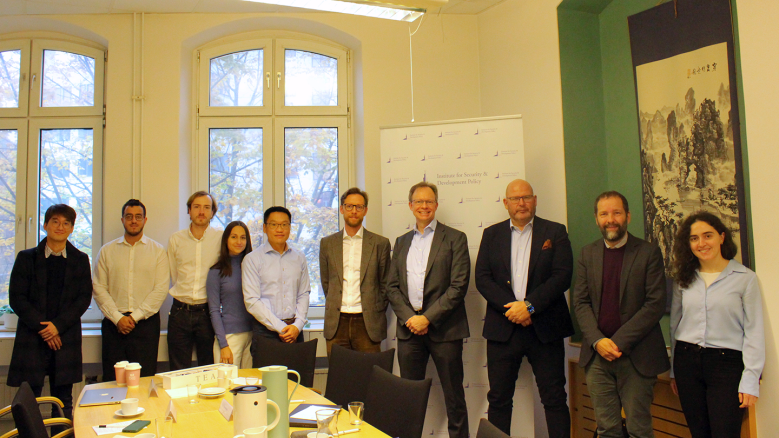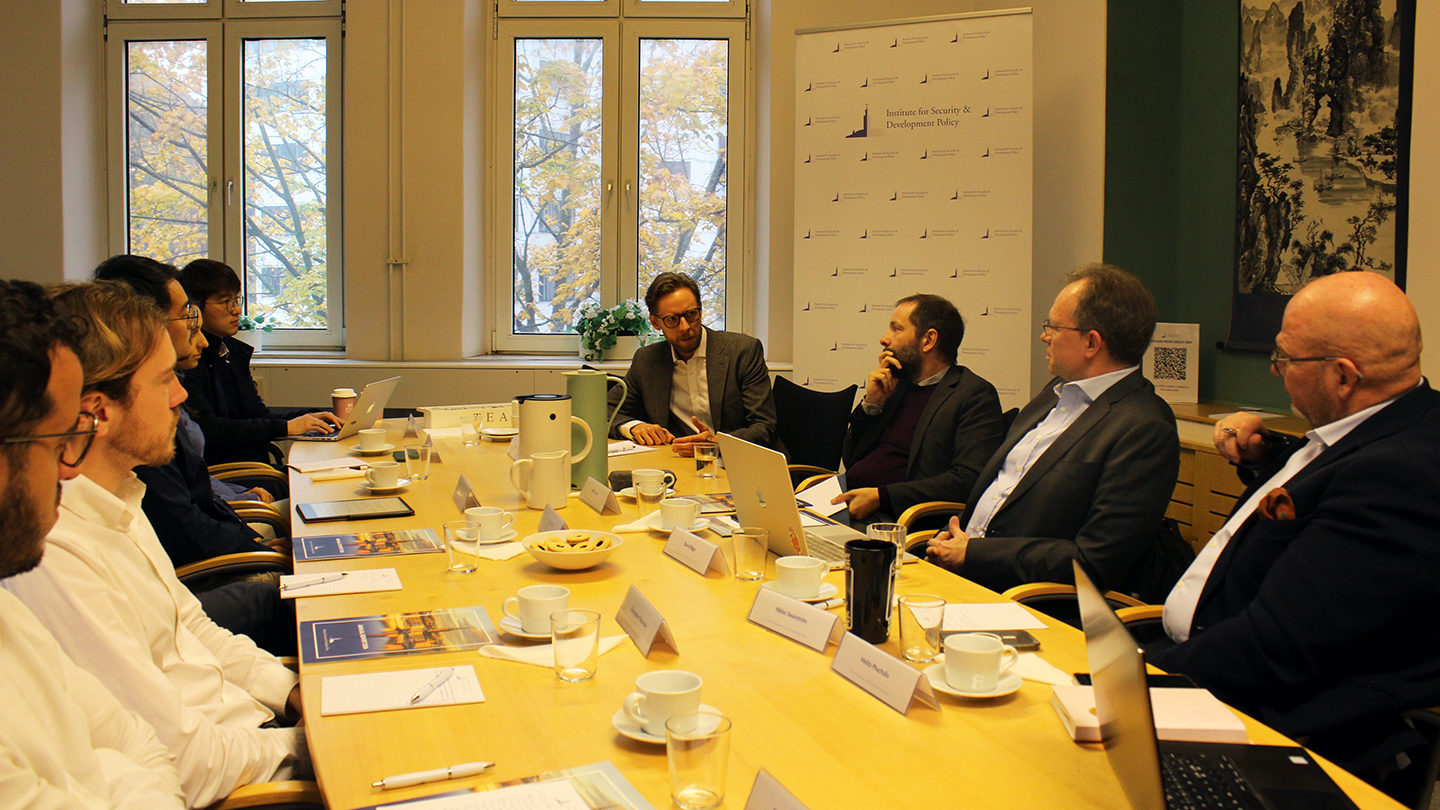ISDP hosted a roundtable discussion with David Biggs focusing on Europe’s evolving role in science, technology, and research security amid shifting global dynamics

November 13, 2025: The Institute for Security and Development Policy (ISDP) hosted a roundtable discussion on October 24 with David Biggs, Senior Fellow, focusing on Europe’s evolving role in science, technology, and research security amid shifting global dynamics. The conversation explored how Europe can navigate reduced US engagement, growing competition with China, and the increasing interconnections between openness, academic freedom, and national security.
The session brought together ISDP staff and invited guests including Albin Gaunt, Policy Manager at the Swedish Foundation for International Cooperation in Research and Higher Education (STINT); Tommy Shih, Senior Lecturer at Lund University, and Director of the Forum for Responsible Internationalization and Research Security at KTH Royal Institute of Technology; Jonas Åkerman, Research Integrity and Ethics Coordinator at the Office for Research, Engagement and Innovation Services (REIS), Stockholm University; and Filip Borges Månsson, MA Student at the Swedish Defence University.

Changing US Approach to Science and Technology
David Biggs outlined how US policy toward science and technology has shifted in recent years.
Until the Trump administration, the USG viewed international S&T collaborations as in the national interest, with some exceptions. Today, science and technology policy has become more transactional and selective, with declining government funding and growing reliance on private sector research.
Biggs noted that the because the U.S. is a country, the S&T model remains centralised, while Europe’s system is more complex due to the diversity of its 27 member states plus the influence of the EU. In the US, the interests of corporations often shape policy outcomes, whereas in the European Union, human rights and ethical considerations remain more central to research governance.
Lessons for Europe
Biggs emphasised that European nations should take a step back and develop a clear theory of change for research and security, and then map out how to get there. Once it’s clear where we need to go, it’s far easier to map out the gaps and roadbumps and figure out what we need to do to get there. It’s easier to see the gaps
He outlined the following points: Governments should focus on how they can help and empower PIs and researchers to know the risks, to create or even force transparency, and to act to mitigate any issues; Create coalitions – coordination mechanisms that could help harmonize EU and member state approaches; governments must equip universities and researchers with tools and training to address emerging risks effectively; Europe can lead in messaging responsible internationalization as a necessary logical step to continue collaborating intelligently and in keeping your research and science from being mis- or mal-appropriated in ways you don’t want. Europe needs to envision weaving openness and security together without importing the more restrictive or adversarial aspects of U.S. policies.
Openness and Security
Participants discussed the balance between openness and security in research. Biggs underlined that “ Europe should embrace and message the idea that secure, transparent, trusted partnerships allow for greater, more open collaborations, and that conversely, openness is security. Secure research and science depends on openness, transparency, and trust. They are mutually reinforcing.” He stressed that the two are often mistakenly framed as opposing forces. A culture of trust and transparency, rather than restriction, is key to Europe’s leadership in global science and technology.
Strategic Priorities for Europe
Three main strategic priorities emerged from the discussion:
- Smart cooperation with China: Europe should continue collaboration but, in a risk-informed, transparent manner that avoids blind dependency.
- Investment in research infrastructure: EU programs such as Horizon Europe strengthen Europe’s competitiveness and attract global talent.
- Welcoming researchers: Europe should remain open to researchers worldwide and should create the infrastructure to receive them without risk of competing with established European researchers, while building strong risk assessment and data protection mechanisms.
Risk Mitigation and Data Protection
Biggs warned that universities need mechanisms to better evaluate partnerships, protect sensitive data, and ensure compliance with research standards.
He also noted that while the GDPR safeguards privacy, it can pose challenges to global data sharing. He called for solutions that enable responsible access to international databases without undermining security.
Science, Sanctions, and Geopolitics
Biggs highlighted the growing politicization of science in both the US and China, where research increasingly is impacted by state agendas. He argued that Europe should continue to focus on building trust with researchers and to assure them that their success is also Europe’s success. That trust is key to compliance and policy success. But researchers also should come to understand that their unintended exposure to malign entities can hurt Europe.
Priority Technology Areas
Biggs outlined several fields where Europe has strong potential for leadership: quantum technologies, including support for a European Quantum Act; ethical AI that safeguards human rights and safety; green technologies and climate modelling for sustainable innovation; cybersecurity and research compliance frameworks to protect European research ecosystems.
Science Diplomacy and Governance
The discussion emphasised that Europe needs to figure out how science diplomacy is failing and then lead. Governments should better integrate diplomats and policymakers into research governance. Biggs stressed the importance of sustained public funding for fundamental research and the need for simplified EU-level funding mechanisms to reduce bureaucratic barriers and enhance cross-border collaboration.
Recommendations:
- Develop a comprehensive European research and security strategy grounded in shared values and a clear vision of successful implementation.
- Simplify EU grant procedures and enhance cross-border funding coordination.
- Support universities and researchers through legal guidance, compliance and due diligence tools, and training programs.
- Promote science diplomacy by involving policymakers and diplomats in shaping international research engagement.
- Maintain academic freedom and openness while implementing smart, targeted risk management frameworks.
The roundtable concluded that Europe stands at a historic and strategic crossroads. Europe has an opportunity to increase its leadership in science and technology, but it must safeguard academic freedom, foster collaboration, and strengthen research security without compromising openness. There’s no question that European scientists will need to continue to collaborate with both Chinese and U.S. entities. In order to do so while maintaining sovereignty and building self-reliance, they will need assistance to see clearly how the PRC’s national interests and long term goals will always trump any other reasons Chinese scientists may have for collaboration, and they will need tools and processes in place to ensure their life’s work is used in ways they intended.
With deliberate policy planning, sustained funding, and stronger institutional support, Europe can lead in developing responsible, secure, and innovative research ecosystems.